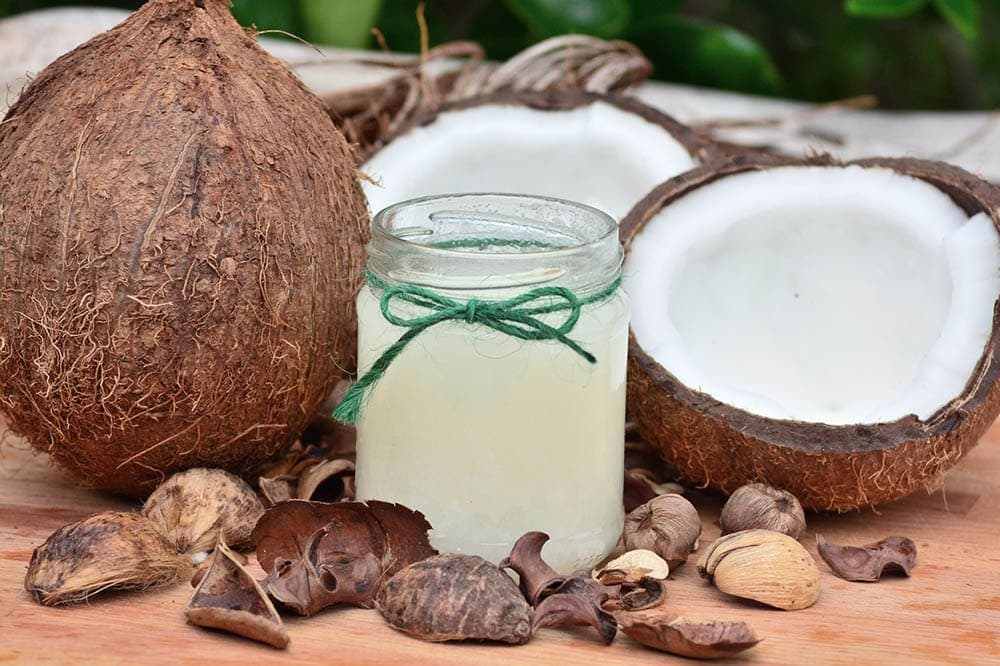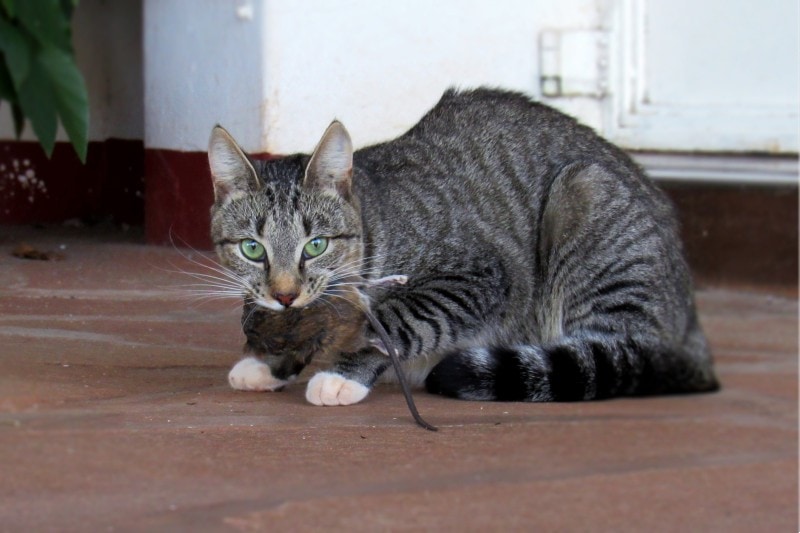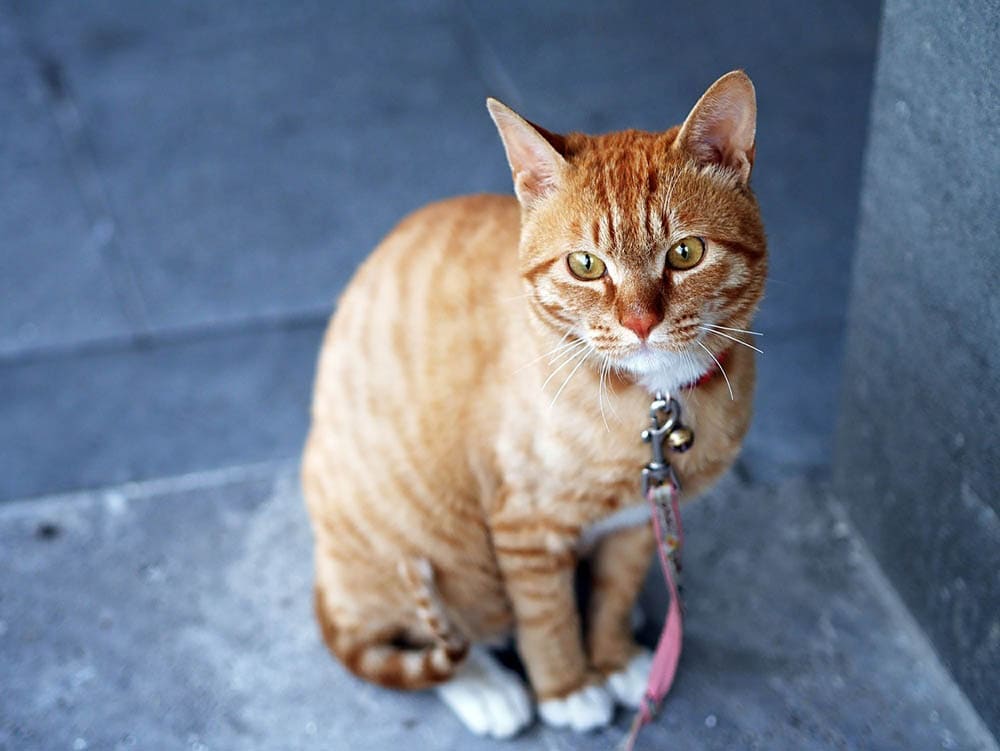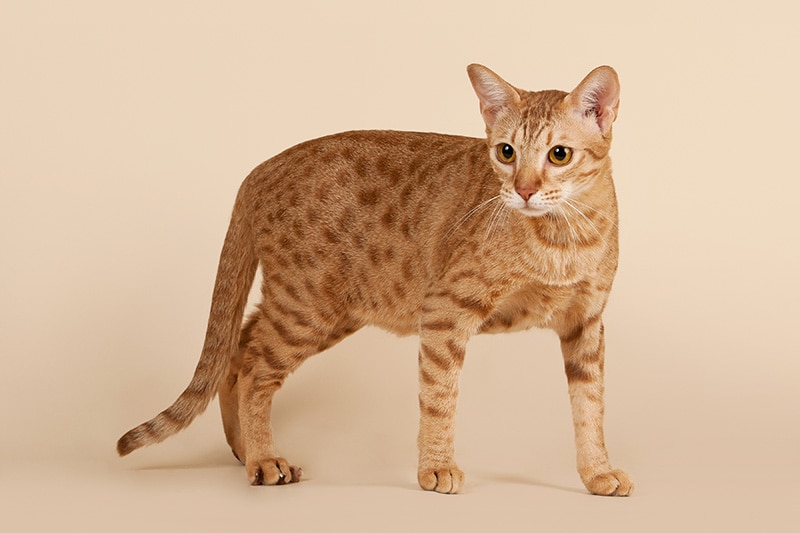Can Cats Eat Coconut? Vet-Reviewed Nutrition Facts & FAQ
Updated on

People seem to have rediscovered coconut in recent years, with production increasing over 20% in the last 20 years.1 If you’ve caught the bug, you may wonder if you can give your cat some, too. After all, it’s such a versatile food, whether you use the oil for cooking, the water for drinking, or the flavoring for foods. Few things bridge the gap in all these areas, including its purported health value.
The short answer is that coconut is not toxic for your cat, and a very small amount is unlikely to cause them serious harm, but it is also not recommended due to its high fat content.
We preface our discussion with a word of caution. There is a lot of misinformation explicitly written about coconut and its products. Our guide will cut through the misconceptions and get to the heart of the matter. However, your veterinarian is the best and most trusted source of information when it comes to what is safe or unsafe for your kitty.
Coconut Meat
Part of what makes this subject more complex is the many forms of coconut that you can eat. Each one is slightly different when it comes to answering this question of whether your cat can eat it. The coconut meat lines the inside of the nuts, although it is technically a drupe like a peach. This food packs a lot of energy in a 100-gram serving, with 354 calories!2
Coconut meat also contains 6.2 grams of sugar, 15.2 grams of carbs, and a whopping 33.5 grams of total fat. These things alone are enough to take it off the menu for your cat. Nevertheless, it is a nutrition powerhouse, with 9 grams of fiber, 356 milligrams of potassium, and 32 milligrams of magnesium—all with no cholesterol. However, bear in mind that we’re talking about the raw meat and not the sweetened variety.
The dried flakes bump up the calorie count to 456 with nearly 37 grams of sugar. These figures provide enough reasons not to give your cat coconut. It’s simply too rich to overset what nutritional value it may offer. However, risking obesity is one thing. The question of whether it’s safe for your kitty to eat is another story. We’ll turn to some other popular coconut products to answer that question.

 Coconut Water
Coconut Water
Coconut water is the liquid inside the drupe. It has a mild flavor that many find tasty. It also has an impressive array of nutrients. A 100-gram serving provides rich sources of calcium, magnesium, and several trace minerals. It also contains less sugar at less than 3 grams and only 19 calories. At first glance, it sounds like a better alternative to meat. The question is whether it’s safe for your cat to drink.
The Potassium Question
We found several articles cautioning about the potassium content of coconut water. The concern rests with the possibility of a pet getting too much and causing a condition called hyperkalemia, where the blood potassium levels are abnormally high. This disorder is often caused by end-stage kidney disease where urine production is reduced or has completely ceased.
It’s true that giving your pet a potassium supplement can inadvertently cause hyperkalemia if not given in the right amount or if the animal does not actually require it. Supplemental potassium is given only based on the vet’s recommendation in cats suffering with illnesses such as chronic kidney disease, where the level of potassium is lower than normal and needs to be regularly monitored by blood testing.
This is not something to decide on without veterinary input. However, let’s put it into context when it comes to coconut water. A 100-gram serving of coconut water contains 250 milligrams of this electrolyte. Recommended potassium intake for an average healthy cat is around 0.33 grams per day, which is 330 milligrams. That portion of coconut water contains 75% of that amount. Let’s take this fact one step further.
The Association of American Feed Control Officials (AAFCO) recommends that an adult cat gets 0.6 grams per kilogram of diet. Using Hill’s Science Diet Adult Urinary Hairball Control Dry Cat Food as an example, we find that this product contains 0.67 grams per kilogram.
These data suggest that coconut water, depending on the amount and frequency of drinking, alongside the potassium content in a particular cat food could contribute to a higher potassium intake, particularly in cats with high potassium levels. However, the risk exists if your cat would get it every day or drink a significant amount rather than just a sip.
The bottom line is that your cat does not need coconut water, and they may still get an upset stomach from drinking it. There’s still more to learn about the safety of coconut.

Coconut Oil
Drilling down the facts about coconut oil is probably the most contentious of the lot because of its alleged health claims. We’ll start with the elephant in the room and talk fat. The calorie question is a moot point since 1 tablespoon of any type is about 120 calories. Coconut oil is no exception. The kind of fat is where the pedal meets the metal.
The total fat content of 1 tablespoon of coconut oil is 13.5 grams. About 11.2 grams are saturated fat with a balance monounsaturated and trans fats. Cat food should contain a minimum recommended amount of crude fat at 9% of dry matter, according to AAFCO guidelines. However, the fat content will depend on the cat’s age, development status, and lifestyle. Usually, cat food contains between 20-40% of fat and maybe a significant source of calories. It’s still evident that coconut oil is pushing these limits for obesity, but it can also lead to stomach upset.
In our research, a common theme was the claim that coconut oil and other fats can increase your pet’s risk of pancreatitis. This condition occurs when digestive enzymes within this organ start to break down its tissue prematurely and release inflammatory compounds, setting off a systemic illness.
While fat may be a predisposing factor in some cases and veterinary professionals may recommend a dietary change in patients with ongoing pancreatitis, the fact remains that we don’t know the exact cause of pancreatitis in cats, and it does not seem to be related to dietary factors. It can result from a complication of diabetes or inflammatory bowel disease (IBD).
Recovery from pancreatitis is possible if it’s caught early and treated promptly, but some cats may suffer from this condition for a few weeks or even months. But we would still stress the recommendation from the ASPCA on avoiding coconut and coconut oil for cats due to risk of digestive issues.
However, that’s not to say that all fat is bad for your cat. A balanced, recommended amount of dietary fat in a high-quality cat food can help improve the skin condition and help your pet pass hairballs. You’ll also find coconut oil as an ingredient in grooming products to treat dry skin. Speak to your vet before considering giving your cat any supplements, as some may contain additional harmful ingredients and may not be suitable for your kitty.
However, there’s one other point we need to address about a misconception that you may read about with coconut oil that warrants an explanation.

Myth About Medium-Chain Triglycerides (MCTs) and Feline Hepatic Lipidosis (FHL)
A search for coconut oil will likely turn up several articles about medium-chain triglycerides (MCTs) and a heightened risk of feline hepatic lipidosis (FHL), usually without a reputable source to verify it.
FHL or fatty liver syndrome is a potentially life-threatening liver condition unique to felines. It happens when there is an influx of fat in a cat’s system that overwhelms the liver with too much to metabolize. This organ serves many vital functions, including its role in metabolism. When FHL occurs, the liver can’t do its job efficiently.
Over 90% of the time, it is a complication from another condition, such as kidney disease, diabetes, or cancer. The scenario typically plays out where a cat will stop eating and become anorexic. The animal’s body then responds by breaking down fat to compensate. That action, in turn, inundates the liver, causing it to pool in the cells.
Unfortunately, the prognosis is poor if it isn’t caught early. It’s also imperative to identify the underlying cause of the condition. It’s worth mentioning that FHL can also occur in overweight pets that stop eating suddenly, with similar results.
There is limited research on the effects of MCTs on the cat’s metabolism and health, and even less studies on coconut oil safety for cats in particular. Some cats also don’t like the taste and may avoid their food if you add any MCTs, and we would recommend not to do so before speaking to your vet. Other pets may have difficulty digesting the fat, causing GI distress and nausea. The best advice we can offer is to check with your vet first. If it’s okay with them and they feel your cat will benefit from it, they will give you clear instructions on how much and how often to offer it to your cat.
Final Thoughts
We can conclude that coconut in whatever form isn’t toxic to cats. However, it’s essential to remember that it’s high in fat and can cause a digestive upset and contribute to weight gain. If you’re going to give your pet coconut meat or its oil, speak to your vet first. While it’s not necessarily all bad, there isn’t enough compelling evidence on this, as the research on its safety or claimed benefits is still lacking. After all, a high-quality diet will provide everything your kitty needs without supplementing it.
See also:
Featured Image Credit: Skica911, Pixabay


 Coconut Water
Coconut Water










